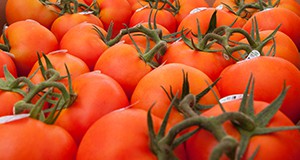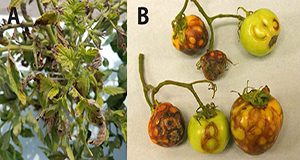Tobamoviruses are mechanically transmitted plant viruses that cause severe economic damage to vegetable and ornamental crops in Florida and worldwide. While certain tomato cultivars have genetic resistance to the most common tobamoviruses, no commercial tomato cultivars are resistant to tomato brown rugose fruit virus (ToBRFV), a recently described tobamovirus that also infects pepper and eggplant. It is currently unknown how ToBRFV may affect tomato production in Florida. This new 5-page publication of the UF/IFAS Plant Pathology Department describes symptoms of the virus, how it is different from other tobamoviruses, and how it is transmitted, as well as what to do if you think you have ToBRFV in your field. Written by Ozgur Batuman, Salih Yilmaz, Pamela Roberts, Eugene McAvoy, Samuel Hutton, Kishore Dey, and Scott Adkins.
https://edis.ifas.ufl.edu/pp360
Tag: Scott Adkins
Tospovirus-Resistant Tomato Varieties for Southern Florida
Tospoviruses are plant-infecting viruses, with three tosposvirus species being particularly relevant to Florida tomato production: Tomato spotted wilt virus, Tomato chlorotic spot virus, and Groundnut ringspot virus. This 5-page document describes the performance of several tospovirus-resistant tomato hybrids based on grower trials in the Homestead, FL production area. Written by Rebecca L. Wente, Samuel F. Hutton, Scott Adkins, William Turechek, and Joseph Funderburk and published by the UF/IFAS Horticultural Sciences Department, December 2017.
http://edis.ifas.ufl.edu/hs1311
Groundnut Ringspot Virus in Florida (PP282)
 Groundnut ringspot virus was recently identified in tomatoes in South Florida — the first report in the United States. It can infect tomato plants at all stages of growth and lead to unmarketable fruits or plant death. This 4-page fact sheet shares what is known about the symptoms, host range, disease transmission, and management. Written by Eugene McAvoy, Scott Adkins, Craig Webster, Charles Mellinger, Loren Horsman, Galen Frantz, Stuart Reitz, and Shouan Zhang, and published by the UF Department of Plant Pathology, July 2011.
Groundnut ringspot virus was recently identified in tomatoes in South Florida — the first report in the United States. It can infect tomato plants at all stages of growth and lead to unmarketable fruits or plant death. This 4-page fact sheet shares what is known about the symptoms, host range, disease transmission, and management. Written by Eugene McAvoy, Scott Adkins, Craig Webster, Charles Mellinger, Loren Horsman, Galen Frantz, Stuart Reitz, and Shouan Zhang, and published by the UF Department of Plant Pathology, July 2011.
http://edis.ifas.ufl.edu/pp282
Recommendations for Management of Whiteflies, Whitefly-transmitted viruses, and Insecticide Resistance for Production of Cucurbit Crops in Florida (EENY478/IN871)
 Until recently, squash has been the only cucurbit crop seriously affected by the B biotype of the sweetpotato whitefly, also known as the silverleaf whitefly, because of the silverleaf disorder induced by feeding of the immature stages (nymphs). However, three viruses transmitted by the whitefly have been identified in watermelon, muskmelon, and squash in Florida since 2004, making whitefly management a priority for most cucurbits. This 8-page fact sheet details the current UF/IFAS recommendations for managing whitefly-transmitted viruses and for delaying the development of resistance to insecticides in the whitefly vector. Published by the UF Department of Entomology and Nematology, July 2011.
Until recently, squash has been the only cucurbit crop seriously affected by the B biotype of the sweetpotato whitefly, also known as the silverleaf whitefly, because of the silverleaf disorder induced by feeding of the immature stages (nymphs). However, three viruses transmitted by the whitefly have been identified in watermelon, muskmelon, and squash in Florida since 2004, making whitefly management a priority for most cucurbits. This 8-page fact sheet details the current UF/IFAS recommendations for managing whitefly-transmitted viruses and for delaying the development of resistance to insecticides in the whitefly vector. Published by the UF Department of Entomology and Nematology, July 2011.
http://edis.ifas.ufl.edu/in871

